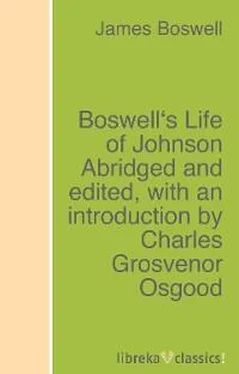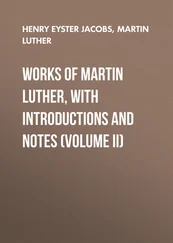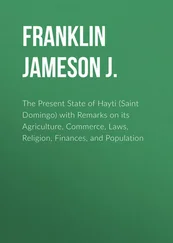James Boswell - Boswell's Life of Johnson Abridged and edited, with an introduction by Charles Grosvenor Osgood
Здесь есть возможность читать онлайн «James Boswell - Boswell's Life of Johnson Abridged and edited, with an introduction by Charles Grosvenor Osgood» — ознакомительный отрывок электронной книги совершенно бесплатно, а после прочтения отрывка купить полную версию. В некоторых случаях можно слушать аудио, скачать через торрент в формате fb2 и присутствует краткое содержание. Жанр: unrecognised, на английском языке. Описание произведения, (предисловие) а так же отзывы посетителей доступны на портале библиотеки ЛибКат.
- Название:Boswell's Life of Johnson Abridged and edited, with an introduction by Charles Grosvenor Osgood
- Автор:
- Жанр:
- Год:неизвестен
- ISBN:нет данных
- Рейтинг книги:4 / 5. Голосов: 1
-
Избранное:Добавить в избранное
- Отзывы:
-
Ваша оценка:
- 80
- 1
- 2
- 3
- 4
- 5
Boswell's Life of Johnson Abridged and edited, with an introduction by Charles Grosvenor Osgood: краткое содержание, описание и аннотация
Предлагаем к чтению аннотацию, описание, краткое содержание или предисловие (зависит от того, что написал сам автор книги «Boswell's Life of Johnson Abridged and edited, with an introduction by Charles Grosvenor Osgood»). Если вы не нашли необходимую информацию о книге — напишите в комментариях, мы постараемся отыскать её.
Boswell's Life of Johnson Abridged and edited, with an introduction by Charles Grosvenor Osgood — читать онлайн ознакомительный отрывок
Ниже представлен текст книги, разбитый по страницам. Система сохранения места последней прочитанной страницы, позволяет с удобством читать онлайн бесплатно книгу «Boswell's Life of Johnson Abridged and edited, with an introduction by Charles Grosvenor Osgood», без необходимости каждый раз заново искать на чём Вы остановились. Поставьте закладку, и сможете в любой момент перейти на страницу, на которой закончили чтение.
Интервал:
Закладка:
Sir, he had heard something of the fabulous tale of the wren sitting upon the eagle's wing, and he had applied it to a linnet. Cibber's familiar style, however, was better than that which Whitehead has assumed. GRAND nonsense is insupportable. Whitehead is but a little man to inscribe verses to players.
'Sir, I do not think Gray a first-rate poet. He has not a bold imagination, nor much command of words. The obscurity in which he has involved himself will not persuade us that he is sublime. His Elegy in a Church-yard has a happy selection of images, but I don't like what are called his great things. His Ode which begins
has been celebrated for its abruptness, and plunging into the subject all at once. But such arts as these have no merit, unless when they are original. We admire them only once; and this abruptness has nothing new in it. We have had it often before. Nay, we have it in the old song of Johnny Armstrong:
And then, Sir,
There, now, you plunge at once into the subject. You have no previous narration to lead you to it. The two next lines in that Ode are, I think, very good:
Finding him in a placid humour, and wishing to avail myself of the opportunity which I fortunately had of consulting a sage, to hear whose wisdom, I conceived in the ardour of youthful imagination, that men filled with a noble enthusiasm for intellectual improvement would gladly have resorted from distant lands;—I opened my mind to him ingenuously, and gave him a little sketch of my life, to which he was pleased to listen with great attention.
I acknowledged, that though educated very strictly in the principles of religion, I had for some time been misled into a certain degree of infidelity; but that I was come now to a better way of thinking, and was fully satisfied of the truth of the Christian revelation, though I was not clear as to every point considered to be orthodox. Being at all times a curious examiner of the human mind, and pleased with an undisguised display of what had passed in it, he called to me with warmth, 'Give me your hand; I have taken a liking to you.' He then began to descant upon the force of testimony, and the little we could know of final causes; so that the objections of, why was it so? or why was it not so? ought not to disturb us: adding, that he himself had at one period been guilty of a temporary neglect of religion, but that it was not the result of argument, but mere absence of thought.
After having given credit to reports of his bigotry, I was agreeably surprized when he expressed the following very liberal sentiment, which has the additional value of obviating an objection to our holy religion, founded upon the discordant tenets of Christians themselves: 'For my part, Sir, I think all Christians, whether Papists or Protestants, agree in the essential articles, and that their differences are trivial, and rather political than religious.'
We talked of belief in ghosts. He said, 'Sir, I make a distinction between what a man may experience by the mere strength of his imagination, and what imagination cannot possibly produce. Thus, suppose I should think that I saw a form, and heard a voice cry "Johnson, you are a very wicked fellow, and unless you repent you will certainly be punished;" my own unworthiness is so deeply impressed upon my mind, that I might IMAGINE I thus saw and heard, and therefore I should not believe that an external communication had been made to me. But if a form should appear, and a voice should tell me that a particular man had died at a particular place, and a particular hour, a fact which I had no apprehension of, nor any means of knowing, and this fact, with all its circumstances, should afterwards be unquestionably proved, I should, in that case, be persuaded that I had supernatural intelligence imparted to me.'
Here it is proper, once for all, to give a true and fair statement of Johnson's way of thinking upon the question, whether departed spirits are ever permitted to appear in this world, or in any way to operate upon human life. He has been ignorantly misrepresented as weakly credulous upon that subject; and, therefore, though I feel an inclination to disdain and treat with silent contempt so foolish a notion concerning my illustrious friend, yet as I find it has gained ground, it is necessary to refute it. The real fact then is, that Johnson had a very philosophical mind, and such a rational respect for testimony, as to make him submit his understanding to what was authentically proved, though he could not comprehend why it was so. Being thus disposed, he was willing to inquire into the truth of any relation of supernatural agency, a general belief of which has prevailed in all nations and ages. But so far was he from being the dupe of implicit faith, that he examined the matter with a jealous attention, and no man was more ready to refute its falsehood when he had discovered it. Churchill, in his poem entitled The Ghost, availed himself of the absurd credulity imputed to Johnson, and drew a caricature of him under the name of 'POMPOSO,' representing him as one of the believers of the story of a Ghost in Cock-lane, which, in the year 1762, had gained very general credit in London. Many of my readers, I am convinced, are to this hour under an impression that Johnson was thus foolishly deceived. It will therefore surprize them a good deal when they are informed upon undoubted authority, that Johnson was one of those by whom the imposture was detected. The story had become so popular, that he thought it should be investigated; and in this research he was assisted by the Reverend Dr. Douglas, now Bishop of Salisbury, the great detector of impostures; who informs me, that after the gentlemen who went and examined into the evidence were satisfied of its falsity, Johnson wrote in their presence an account of it, which was published in the newspapers and Gentleman's Magazine, and undeceived the world.
Our conversation proceeded. 'Sir, (said he) I am a friend to subordination, as most conducive to the happiness of society. There is a reciprocal pleasure in governing and being governed.'
'Dr. Goldsmith is one of the first men we now have as an authour, and he is a very worthy man too. He has been loose in his principles, but he is coming right.'
I complained to him that I had not yet acquired much knowledge, and asked his advice as to my studies. He said, 'Don't talk of study now. I will give you a plan; but it will require some time to consider of it.' 'It is very good in you (I replied,) to allow me to be with you thus. Had it been foretold to me some years ago that I should pass an evening with the authour of The Rambler, how should I have exulted!' What I then expressed, was sincerely from the heart. He was satisfied that it was, and cordially answered, 'Sir, I am glad we have met. I hope we shall pass many evenings and mornings too, together.' We finished a couple of bottles of port, and sat till between one and two in the morning.
As Dr. Oliver Goldsmith will frequently appear in this narrative, I shall endeavour to make my readers in some degree acquainted with his singular character. He was a native of Ireland, and a contemporary with Mr. Burke at Trinity College, Dublin, but did not then give much promise of future celebrity. He, however, observed to Mr. Malone, that 'though he made no great figure in mathematicks, which was a study in much repute there, he could turn an Ode of Horace into English better than any of them.' He afterwards studied physick at Edinburgh, and upon the Continent; and I have been informed, was enabled to pursue his travels on foot, partly by demanding at Universities to enter the lists as a disputant, by which, according to the custom of many of them, he was entitled to the premium of a crown, when luckily for him his challenge was not accepted; so that, as I once observed to Dr. Johnson, he DISPUTED his passage through Europe. He then came to England, and was employed successively in the capacities of an usher to an academy, a corrector of the press, a reviewer, and a writer for a news-paper. He had sagacity enough to cultivate assiduously the acquaintance of Johnson, and his faculties were gradually enlarged by the contemplation of such a model. To me and many others it appeared that he studiously copied the manner of Johnson, though, indeed, upon a smaller scale.
Читать дальшеИнтервал:
Закладка:
Похожие книги на «Boswell's Life of Johnson Abridged and edited, with an introduction by Charles Grosvenor Osgood»
Представляем Вашему вниманию похожие книги на «Boswell's Life of Johnson Abridged and edited, with an introduction by Charles Grosvenor Osgood» списком для выбора. Мы отобрали схожую по названию и смыслу литературу в надежде предоставить читателям больше вариантов отыскать новые, интересные, ещё непрочитанные произведения.
Обсуждение, отзывы о книге «Boswell's Life of Johnson Abridged and edited, with an introduction by Charles Grosvenor Osgood» и просто собственные мнения читателей. Оставьте ваши комментарии, напишите, что Вы думаете о произведении, его смысле или главных героях. Укажите что конкретно понравилось, а что нет, и почему Вы так считаете.












